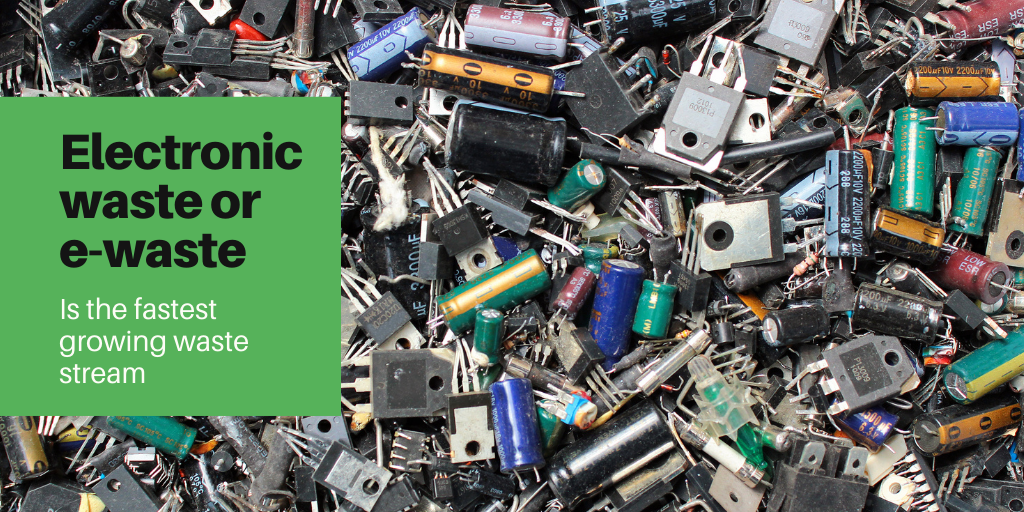Ahmedabad
(Head Office)Address : 506, 3rd EYE THREE (III), Opp. Induben Khakhrawala, Girish Cold Drink Cross Road, CG Road, Navrangpura, Ahmedabad, 380009.
Mobile : 8469231587 / 9586028957
Telephone : 079-40098991
E-mail: dics.upsc@gmail.com

E-Waste
News: Discarded laptops and smartphones contain valuable metals. However, extraction, usually performed by children, is a crude and hazardous process that goes unregulated.
Background:
According to the Global E-waste Monitor 2020, the world dumped 53.6 million metric tons of e-waste in 2019. India produced 3.2 million metric tons of ewaste, much of which is dumped for dismantling and recycling in Seelampur with no regulations.
What are E-Waste?
The term electronic and electrical waste (e-waste) refers to “electrical or electronic equipment, which is waste, including all components, subassemblies, and consumables, which are part of the equipment at the time the equipment becomes waste”.
E-waste includes large, discarded appliances, such as refrigerators, air conditioners, and washing machines, as well as small personal items, including computers, televisions, mobile phones, and many other devices that are operated by electrical currents or batteries.
What health risks are children exposed to?
Toxic substances such as lead, cadmium, mercury, and flame retardants, can be harmful if not properly disposed of. Serious skin diseases and chronic lung infections due to continuous exposure to these chemical-laden toxins.
Even relatively low lead exposure in children can result in a reduction in total intelligence quotient (IQ) and several behavioral abnormalities.
Contaminated soil and water potentially affect the health of local populations, including children.
In some developing countries, e-waste dumping has caused environmental degradation and health problems, leading to school closures and limiting children’s access to education.
What are India’s initiatives to tackle e-waste?
Extended Producer Responsibility; Design for Environment; (3Rs) Reduce, Reuse, recycle technology platform for linking the market facilitating the circular economy aim to encourage consumers to correctly dispose of the e-waste.
India has tried to tackle this unregulated industry and introduced a series of laws in 2011 and 2016 mandating the authorization and registration of all e-waste recycling facilities, along with directives for workers to use protective equipment while dismantling the waste. However, activists say these laws are not strongly enforced and the majority of the e-waste market in India remains unregulated.
India’s First e-Waste clinic was setup in Bhopal, MP.

Address : 506, 3rd EYE THREE (III), Opp. Induben Khakhrawala, Girish Cold Drink Cross Road, CG Road, Navrangpura, Ahmedabad, 380009.
Mobile : 8469231587 / 9586028957
Telephone : 079-40098991
E-mail: dics.upsc@gmail.com
Address: A-306, The Landmark, Urjanagar-1, Opp. Spicy Street, Kudasan – Por Road, Kudasan, Gandhinagar – 382421
Mobile : 9723832444 / 9723932444
E-mail: dics.gnagar@gmail.com
Address: 2nd Floor, 9 Shivali Society, L&T Circle, opp. Ratri Bazar, Karelibaugh, Vadodara, 390018
Mobile : 9725692037 / 9725692054
E-mail: dics.vadodara@gmail.com
Address: 403, Raj Victoria, Opp. Pal Walkway, Near Galaxy Circle, Pal, Surat-394510
Mobile : 8401031583 / 8401031587
E-mail: dics.surat@gmail.com
Address: 303,305 K 158 Complex Above Magson, Sindhubhavan Road Ahmedabad-380059
Mobile : 9974751177 / 8469231587
E-mail: dicssbr@gmail.com
Address: 57/17, 2nd Floor, Old Rajinder Nagar Market, Bada Bazaar Marg, Delhi-60
Mobile : 9104830862 / 9104830865
E-mail: dics.newdelhi@gmail.com